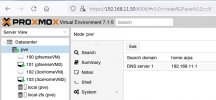I'm new to Proxmox and not sure how to further investigate this fault. Any ideas would be appreciated
Fault
Recent changes
System hardware summary
Network configuration
Main network
lan: Gateway / DNS / DHCP / 192.168.11.1/24 (via pfsense)
Proxmox: 192.168.11.50/24, VLAN not used
VoIP network
3CX: 192.168.12.55/24, VLAN not used
pfsense: VLAN aware, Main on VLAN 11, VoIP VAN 12,
Netgear managed switch used to connect devices & servers



Configuration settings
/etc/network/interfaces
/etc/hosts
systemctl status networking.service
ip addr
Fault
- Proxmox hypervisor has no network access. Ping 192.168.11.1 gateway has 100% packet loss, chrony fails to access any time servers, update servers are unable to refresh.
- Lan Web access to Proxmox hypervistor works
- VMs on Proxmox with pass through Nic all function OK
Recent changes
- Proxmox fresh install on hardware not long after 7.0 was released
- Enabled pve-no-subscription repository yesterday and upgraded to debain and Proxmox to current version -> fault started
- Noted host file had old pve IP so updated to correct IP & subnet. Ensured gateway & DNS also current -> No change in fault
- Checked modifications to Proxmox hypervistor intact. Changes reapplied -> no change
- Restart Proxmox hypervistor -> no change
System hardware summary
- Proxmox a single board computer with 6 Intel NIC
- One Nic has a bridge in Proxmox and is used for Management console and Proxmox internet access via Lan gateway through pfsense.
- pfsense runs on a VM with 4 NIC passed through (WAN and 3 LAN)
- 3cx runs as a VM with 1 NIC passed through (externally connected to VoIP lan with pfsense gateway)
Network configuration
Main network
lan: Gateway / DNS / DHCP / 192.168.11.1/24 (via pfsense)
Proxmox: 192.168.11.50/24, VLAN not used
VoIP network
3CX: 192.168.12.55/24, VLAN not used
pfsense: VLAN aware, Main on VLAN 11, VoIP VAN 12,
Netgear managed switch used to connect devices & servers



Configuration settings
/etc/network/interfaces
Code:
auto lo
iface lo inet loopback
iface enp2s0 inet manual
#Lan5
iface enp1s0 inet manual
#Lan6(Wan passthrough)
iface enp3s0 inet manual
#Lan4(3cx)
iface enp4s0 inet manual
#Lan3(Passthrough)
iface enp5s0 inet manual
#Lan2(Passthrough)
iface enp6s0 inet manual
#Lan1(Passthrough)
auto vmbr0
iface vmbr0 inet static
address 192.168.11.50/24
gateway 192.168.11.1
bridge-ports enp2s0
bridge-stp off
bridge-fd 0
#Lan5/etc/hosts
Code:
127.0.0.1 localhost.localdomain localhost
192.168.11.50 pve.home.arpa pve
# The following lines are desirable for IPv6 capable hosts
::1 ip6-localhost ip6-loopback
fe00::0 ip6-localnet
ff00::0 ip6-mcastprefix
ff02::1 ip6-allnodes
ff02::2 ip6-allrouters
ff02::3 ip6-allhostssystemctl status networking.service
Code:
● networking.service - Network initialization
Loaded: loaded (/lib/systemd/system/networking.service; enabled; vendor preset: enabled)
Active: active (exited) since Sun 2021-11-21 12:13:02 ACDT; 45min ago
Docs: man:interfaces(5)
man:ifup(8)
man:ifdown(8)
Process: 1266 ExecStart=/usr/share/ifupdown2/sbin/start-networking start (code=exited, status=0/SUCCESS)
Main PID: 1266 (code=exited, status=0/SUCCESS)
CPU: 365ms
Nov 21 12:13:01 pve systemd[1]: Starting Network initialization...
Nov 21 12:13:02 pve networking[1266]: networking: Configuring network interfaces
Nov 21 12:13:02 pve systemd[1]: Finished Network initialization.ip addr
Code:
1: lo: <LOOPBACK,UP,LOWER_UP> mtu 65536 qdisc noqueue state UNKNOWN group default qlen 1000
link/loopback 00:00:00:00:00:00 brd 00:00:00:00:00:00
inet 127.0.0.1/8 scope host lo
valid_lft forever preferred_lft forever
inet6 ::1/128 scope host
valid_lft forever preferred_lft forever
3: enp2s0: <BROADCAST,MULTICAST,UP,LOWER_UP> mtu 1500 qdisc mq master vmbr0 state UP group default qlen 1000
link/ether 00:f4:21:68:27:50 brd ff:ff:ff:ff:ff:ff
8: vmbr0: <BROADCAST,MULTICAST,UP,LOWER_UP> mtu 1500 qdisc noqueue state UP group default qlen 1000
link/ether 00:f4:21:68:27:50 brd ff:ff:ff:ff:ff:ff
inet 192.168.11.50/24 scope global vmbr0
valid_lft forever preferred_lft forever
inet6 fe80::2f4:21ff:fe68:2750/64 scope link
valid_lft forever preferred_lft forever
Code:
root@pve:~# cat /etc/default/pveproxy
cat: /etc/default/pveproxy: No such file or directory
Code:
ss -tlpn
Code:
State Recv-Q Send-Q Local Address:Port Peer Address: Port Process
LISTEN 0 4096 0.0.0.0:111 0.0.0.0:* "users:((""rpcbind"",pid=1295,fd=4),(""systemd"",pid=1,fd=35))"
LISTEN 0 4096 127.0.0.1:85 0.0.0.0:* "users:((""pvedaemon worke"",pid=1787,fd=6),(""pvedaemon worke"",pid=1786,fd=6),(""pvedaemon worke"",pid=1784,fd=6),(""pvedaemon"",pid=1783,fd=6))"
LISTEN 0 128 0.0.0.0:22 0.0.0.0:* "users:((""sshd"",pid=1496,fd=3))"
LISTEN 0 100 127.0.0.1:25 0.0.0.0:* "users:((""master"",pid=1729,fd=13))"
LISTEN 0 4096 127.0.0.1:61000 0.0.0.0:* "users:((""kvm"",pid=1920,fd=15))"
LISTEN 0 4096 127.0.0.1:61001 0.0.0.0:* "users:((""kvm"",pid=3131,fd=15))"
LISTEN 0 4096 [::]:111 [::]:* "users:((""rpcbind"",pid=1295,fd=6),(""systemd"",pid=1,fd=37))"
LISTEN 0 128 [::]:22 [::]:* "users:((""sshd"",pid=1496,fd=4))"
LISTEN 0 4096 *:3128 *:* "users:((""spiceproxy work"",pid=1808,fd=6),(""spiceproxy"",pid=1807,fd=6))"
LISTEN 0 100 [::1]:25 [::]:* "users:((""master"",pid=1729,fd=14))"
LISTEN 0 4096 *:8006 *:* "users:((""pveproxy worker"",pid=408946,fd=6),(""pveproxy worker"",pid=405516,fd=6),(""pveproxy worker"",pid=403942,fd=6),(""pveproxy"",pid=1801,fd=6))"Attachments
Last edited:

